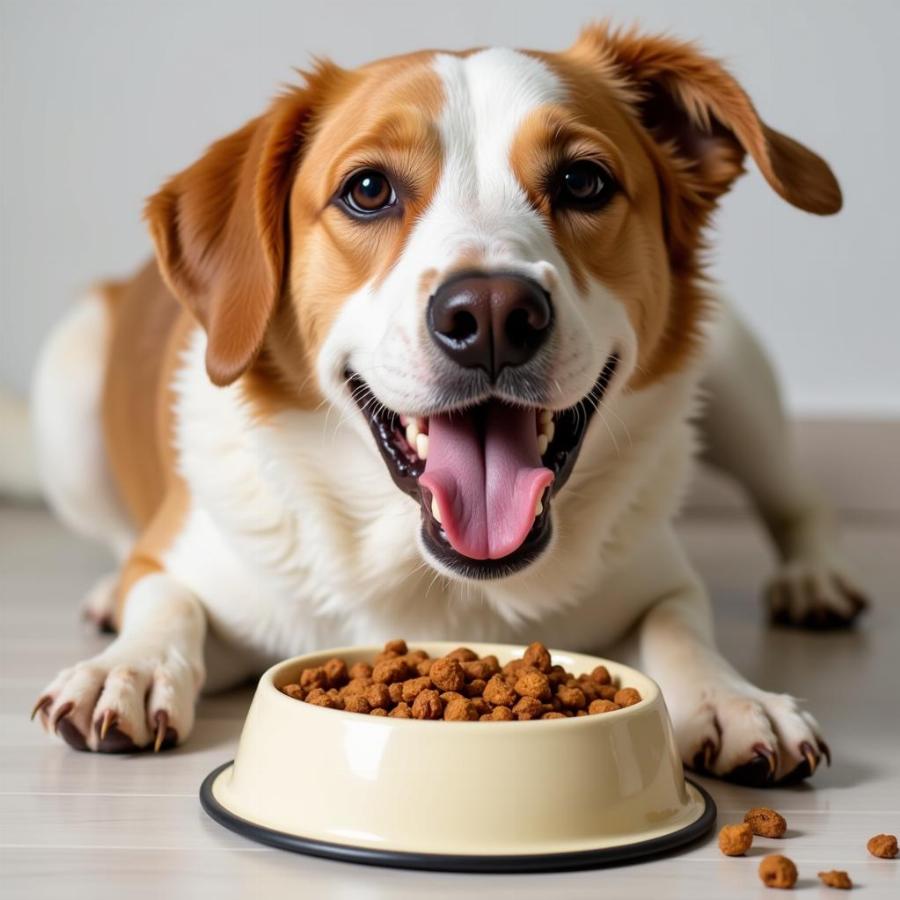Diarrhea in dogs is a common occurrence, characterized by loose, watery, or frequent bowel movements. Understanding the causes of diarrhea in dogs is crucial for effective treatment and prevention. This article will delve into the various factors that can contribute to diarrhea in your canine companion, empowering you to provide the best possible care.
Common Causes of Diarrhea in Dogs
Several factors can trigger diarrhea in dogs, ranging from dietary indiscretions to serious underlying medical conditions. Let’s explore some of the most common causes:
Dietary Indiscretions
One of the most frequent causes of diarrhea in dogs is scavenging and eating something they shouldn’t, like garbage, spoiled food, or even grass. This can upset their digestive system and lead to loose stools. Changes in diet, such as switching to a new food too quickly, can also cause diarrhea. Food allergies or intolerances can manifest as chronic diarrhea.
Infections
Bacterial, viral, and parasitic infections can all cause diarrhea in dogs. Common culprits include parvovirus, coronavirus, salmonella, and giardia. These infections often require veterinary intervention and can be serious, especially in puppies.
Stress and Anxiety
Just like humans, dogs can experience stress and anxiety, which can manifest as digestive upset, including diarrhea. Changes in routine, travel, or new environments can all be stressful for dogs.
Medications
Certain medications, such as antibiotics, can disrupt the gut flora and cause diarrhea as a side effect. Always consult with your veterinarian about potential side effects before administering any medication to your dog.
Underlying Medical Conditions
Diarrhea can be a symptom of more serious underlying medical conditions, such as inflammatory bowel disease (IBD), pancreatitis, or even cancer. If your dog’s diarrhea is persistent or accompanied by other symptoms, it’s crucial to seek veterinary attention.
What Causes Dogs to Get Diarrhea Suddenly?
Sudden onset diarrhea can be alarming, and it’s essential to identify the potential triggers. Some of the most common causes of acute diarrhea include dietary indiscretions, infections, and stress.
Dietary Changes and Scavenging
If your dog suddenly develops diarrhea after eating something new or scavenging in the garbage, it’s likely a dietary issue. Monitor their symptoms closely, and if they persist, consult your veterinarian.
Infections: Viral, Bacterial, and Parasitic
Infections can cause rapid onset diarrhea, often accompanied by other symptoms like vomiting, lethargy, and fever. Prompt veterinary care is essential for diagnosis and treatment.
Stressful Events
Sudden changes in routine, such as moving to a new home or the introduction of a new pet, can trigger stress-induced diarrhea. Providing a calm and reassuring environment can help alleviate these symptoms.
How to Treat Diarrhea in Dogs
Treatment for diarrhea in dogs depends on the underlying cause. While mild cases may resolve with home care, more serious cases require veterinary intervention.
Home Care for Mild Diarrhea
For mild cases, withholding food for 12-24 hours can help rest the digestive system. Offer small amounts of bland food, such as boiled chicken and rice, once the fasting period is over. Ensure your dog has access to fresh water to prevent dehydration.
Veterinary Care for Persistent or Severe Diarrhea
If your dog’s diarrhea persists for more than 24 hours, is accompanied by other symptoms, or is bloody, seek immediate veterinary attention. Your veterinarian can diagnose the underlying cause and recommend appropriate treatment.
Preventing Diarrhea in Dogs
Preventing diarrhea involves managing your dog’s diet, environment, and overall health. Here are some preventative measures:
- Avoid Dietary Indiscretions: Prevent your dog from scavenging by keeping garbage securely stored and avoiding feeding table scraps.
- Vaccinations and Parasite Prevention: Keep your dog up-to-date on vaccinations and parasite preventatives to protect them from infections.
- Gradual Diet Changes: Introduce new foods gradually to avoid upsetting your dog’s digestive system.
- Manage Stress: Provide a calm and predictable environment for your dog, especially during times of change.
Conclusion
Diarrhea in dogs can be caused by various factors, ranging from dietary issues to serious medical conditions. Understanding these causes is crucial for providing effective treatment and implementing preventative measures. By monitoring your dog’s symptoms and seeking veterinary care when necessary, you can help keep your canine companion healthy and happy.
FAQs
- What can I give my dog for diarrhea? For mild cases, withholding food and offering bland food like boiled chicken and rice can help. However, consult your vet before administering any medication.
- When should I take my dog to the vet for diarrhea? If diarrhea persists for more than 24 hours, contains blood, or is accompanied by other symptoms, seek veterinary care immediately.
- Can stress cause diarrhea in dogs? Yes, stress and anxiety can upset a dog’s digestive system and lead to diarrhea.
- What are the signs of dehydration in dogs with diarrhea? Signs include lethargy, dry gums, sunken eyes, and loss of skin elasticity.
- How can I prevent my dog from getting diarrhea? Avoid dietary indiscretions, keep vaccinations and parasite preventatives up-to-date, introduce new foods gradually, and manage stress.
- Is dog diarrhea contagious to humans? Some causes of diarrhea, like certain parasites, can be contagious to humans. Practice good hygiene.
- What is the difference between large and small bowel diarrhea in dogs? Large bowel diarrhea often involves straining and mucus, while small bowel diarrhea is typically watery and more voluminous.
 Healthy Dog Eating
Healthy Dog Eating
Beaut Dogs is your trusted source for comprehensive information on all things related to show dogs. We offer expert advice on breed selection, care, and training to ensure your canine companion thrives. When you need support, contact us via Email at [email protected] for detailed and accurate answers from Beaut Dogs. Visit us at https://beautdogs.com.